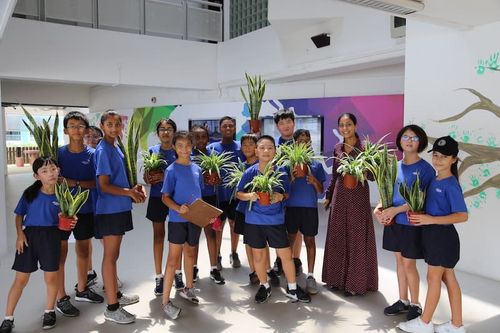At One World International School, we provide children with a well-rounded, rigorous education that prepares them for the future. Our inquiry-based approach empowers students to take ownership of their learning so that it becomes a lifelong pursuit. It helps them to become adaptable learners who want to further their knowledge of the world around them.
We prepare them to become adaptable so they can successfully navigate the challenges of changing worldviews and emerging technologies. Our curricula differ markedly from the more rigid, or knowledge-based, approach to learning. We integrate a range of different learning methods and allow children to guide their knowledge acquisition. Here are some of the primary differences between the two frameworks.

Memorisation vs. Inquiry
Knowledge-driven learning consists of absorbing facts. It is the generic learning method seen in so many institutions and requires a considerable amount of rote memorisation. Concept-based learning, on the other hand, encourages children to delve more deeply into a particular topic by asking questions or suggesting problems to be solved and directing their research accordingly. Investigating topics and collaborating with their peers gives students a sense of responsibility in the learning process. It also teaches them to look at the bigger picture and not to always just stop at the first answer.
Lesson-Centred vs. Student-Centred
In knowledge-based frameworks, students are presented with questions typically devised by the teacher (or textbook publisher) to assess how well they have memorised specific facts. It can often be generic and a lot of the time the questions do not develop, adapt or change over the years.
Concept-based curricula, however, focus on the learner. Rather than being teacher or lesson-centred, this approach is holistic; it provides students with the opportunities to think, question and explore their world. It encourages the children to be the teachers, to work with others and to delve deeper into the topic of question. Concept-based learning supports physical, social and emotional development while nurturing children’s natural curiosity and strengthening their understanding by focussing on the ‘why’ and ‘how’.
Isolated Contexts vs. Real-World Application

In a knowledge-based classroom, students learn facts as they pertain to the lesson, so the context in which they’re applied is highly limited. Often children do not see the reasoning behind the learning and it is easy for them to lose interest. In a concept-based learning environment, children investigate topics across subject areas. This transdisciplinary approach allows children to see how what they’re learning applies to a variety of real-world situations.
It encourages them to see the wider world and to understand that there is more to life than the bubble they may live in. This also offers a platform for children to learn about the diversity around them. Whether it be discussing different experiences that their peers may have had through their lives, or trying out new skills that they may not have used before to put knowledge into practice.
Present-Day Application vs. Future-Proof Learning
With a knowledge-based framework, children can only consider what they’re learning in the context of the lesson or a particular class. They do not look at the bigger picture or link this to current affairs. Therefore, their knowledge can quickly become obsolete. A concept-based approach requires higher-level thinking skills.
By asking questions and taking the initiative to find the answers, students integrate new knowledge with what they already know. As they make connections between prior knowledge and new concepts, they gain a better understanding of the subject matter than they can merely through memorisation. They also gain a true understanding of how fast the world is progressing, being able to see that ideas that at one point may have seemed ahead of their time now seem outdated. They learn to understand the importance of constantly learning, developing and trying to stay ahead of the game when it comes to knowledge and skills.
Some of the higher-order skills cultivated through concept development include creativity, communication, collaboration, critical thinking and problem-solving. By “learning how to learn”, students are able to see the value of applying knowledge across subject areas and build on their existing concepts to keep their knowledge up-to-date.
Core Concepts of Curricula at OWIS
Our framework is based on the eight core concepts of the International Baccalaureate Primary Years Programme (IB PYP):
1. Form – What is it like?
2. Function – How does it work?
3. Connection – How is it linked to other things?
4. Change – How is it changing?
5. Causation- – Why is it the way it is?
6. Perspective – What are the different points of view?
7. Responsibility – How can we be responsible?
8. Reflection – How do we know?

A concept-driven approach personalises the learning, making it more meaningful and relevant to the demands of living in the 21st century. The PYP also engenders in students a sense of international-mindedness, which is becoming increasingly important in today’s diverse society and global economy. It helps them become global citizens with a range of skills, teaching them that the world is constantly progressing and in order to stay up to date with present times, they need to keep on top of their development.
The PYP encourages students to consider different perspectives and broaden their understanding of different languages and cultures. In age-appropriate contexts, students explore topics related to the environment, governance and other social issues.
Natalie D., who has three children studying at OWIS, says of the primary curriculum, “They like working on their unit of inquiry projects, and they enjoy working on those projects together and with their teacher. My youngest one is working on a lemonade stand with her friends, and she has become the group financial advisor for that project. It’s really nice to see her and the girls empowered with economic literacy at such a young age, this is grade three. They’re able to put their proposal or their plan together, bring it together and serve other students and set an example.”
At OWIS, we provide students with skills that allow them to transfer their knowledge across subject areas in authentic contexts, now and in the future. We use the PYP because it aligns with our goal to prepare students to become compassionate, innovative global citizens and leaders.
Please contact us for more information, or to book a tour.
(This blog was originally written in collaboration with Ms Erin Smith, former Senior Coordinator – Primary School & PYP, OWIS Nanyang.)














